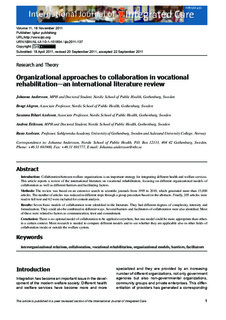Organizational approaches to collaboration in vocational rehabilitation - an international literature review
Journal article, Peer reviewed
Published version
Permanent lenke
http://hdl.handle.net/11250/2621191Utgivelsesdato
2011Metadata
Vis full innførselSamlinger
Sammendrag
Introduction
Collaboration between welfare organizations is an important strategy for integrating different health and welfare services. This article reports a review of the international literature on vocational rehabilitation, focusing on different organizational models of collaboration as well as different barriers and facilitating factors.
Methods
The review was based on an extensive search in scientific journals from 1995 to 2010, which generated more than 13,000 articles. The number of articles was reduced in different steps through a group procedure based on the abstracts. Finally, 205 articles were read in full text and 62 were included for content analysis.
Results
Seven basic models of collaboration were identified in the literature. They had different degrees of complexity, intensity and formalization. They could also be combined in different ways. Several barriers and facilitators of collaboration were also identified. Most of these were related to factors as communication, trust and commitment.
Conclusion
There is no optimal model of collaboration to be applied everywhere, but one model could be more appropriate than others in a certain context. More research is needed to compare different models and to see whether they are applicable also in other fields of collaboration inside or outside the welfare system.

